Sustainable and Responsible Management in Tourism (DISTINCTION CRITERIA)
VerifiedAdded on 2023/06/10
|11
|3732
|145
AI Summary
This report discusses the theories, principles, and key concepts of sustainable and responsible management in the tourism industry. It covers the benefits of sustainable and responsible management of tourism, the importance of technology and innovation, and the role of stakeholders in sustainable industry.
Contribute Materials
Your contribution can guide someone’s learning journey. Share your
documents today.
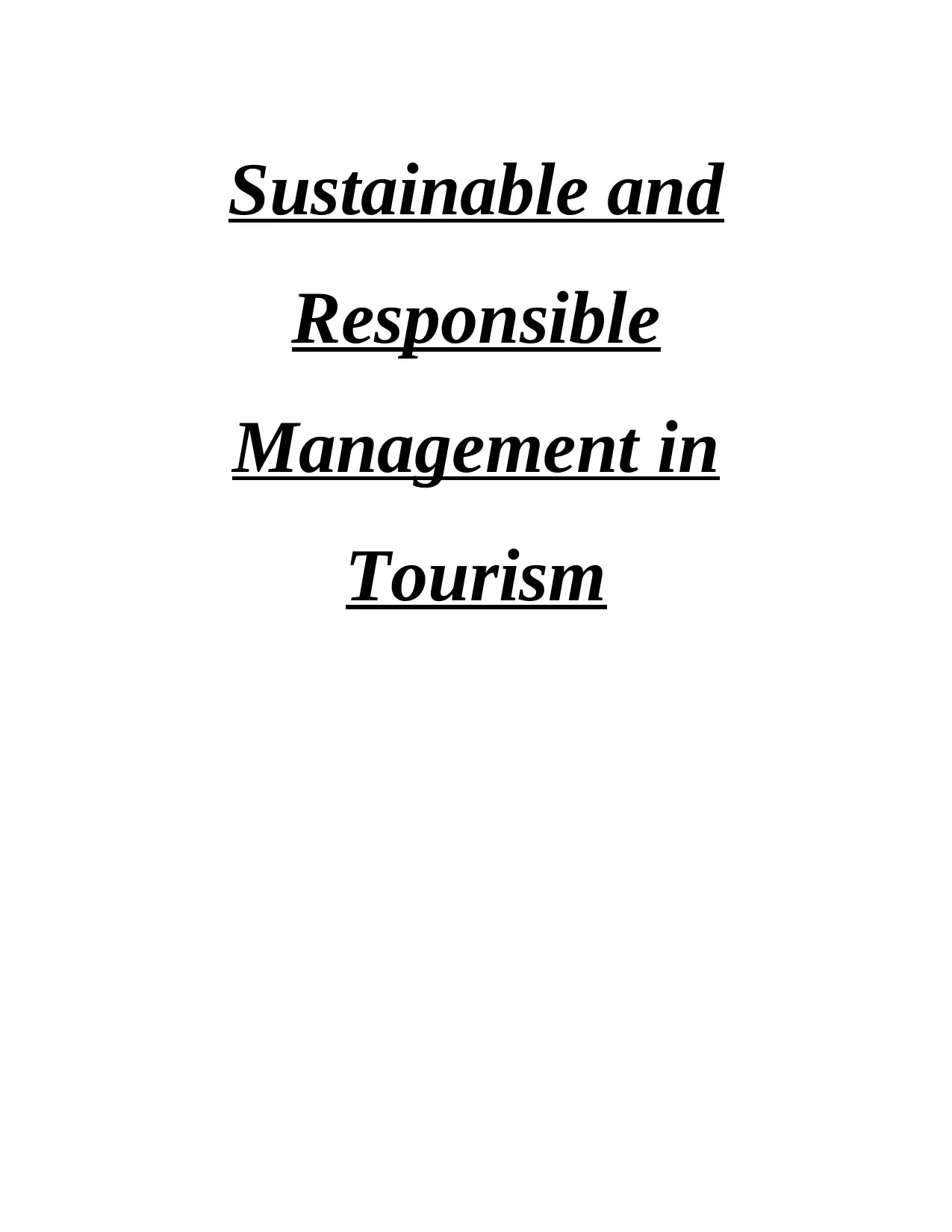
Sustainable and
Responsible
Management in
Tourism
Responsible
Management in
Tourism
Secure Best Marks with AI Grader
Need help grading? Try our AI Grader for instant feedback on your assignments.
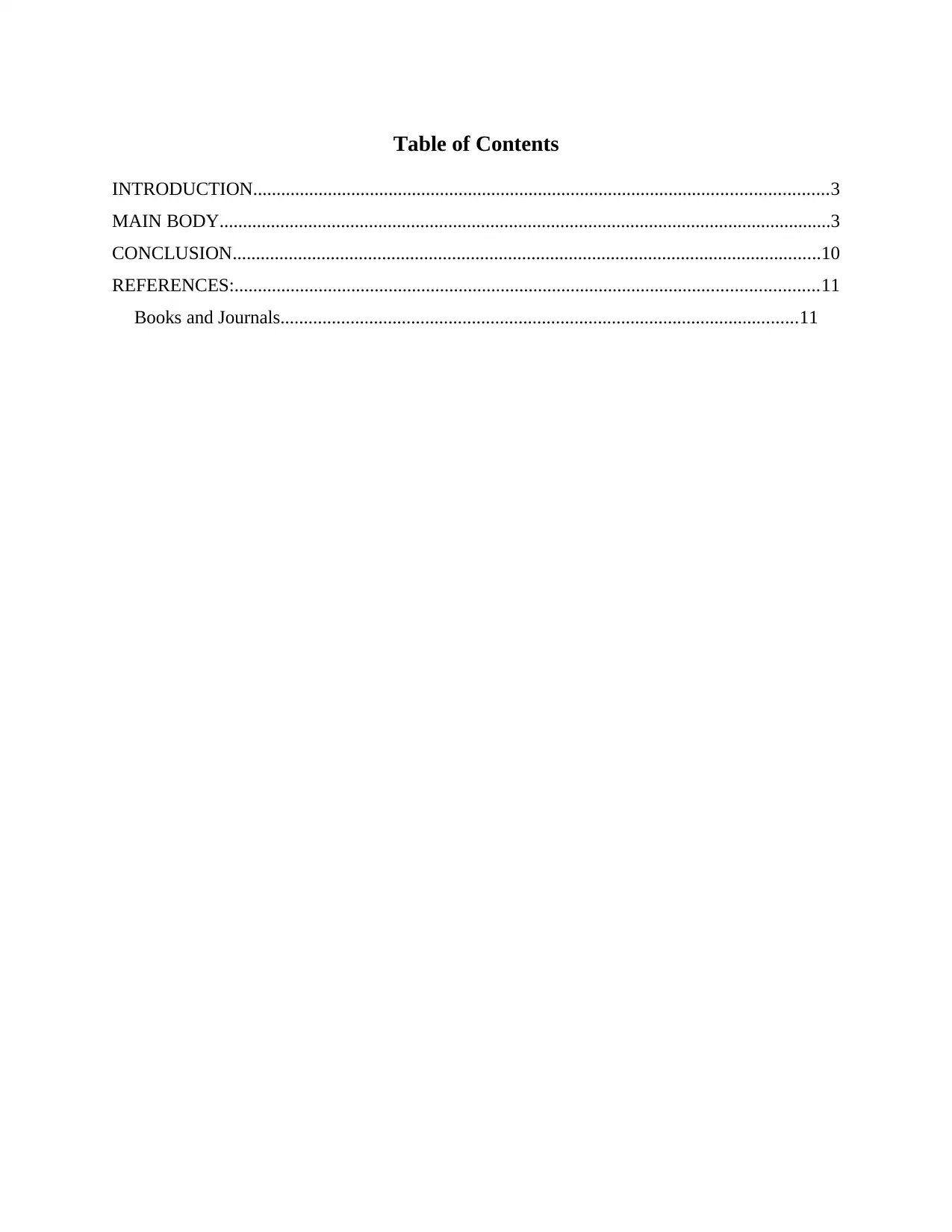
Table of Contents
INTRODUCTION...........................................................................................................................3
MAIN BODY...................................................................................................................................3
CONCLUSION..............................................................................................................................10
REFERENCES:.............................................................................................................................11
Books and Journals...............................................................................................................11
INTRODUCTION...........................................................................................................................3
MAIN BODY...................................................................................................................................3
CONCLUSION..............................................................................................................................10
REFERENCES:.............................................................................................................................11
Books and Journals...............................................................................................................11
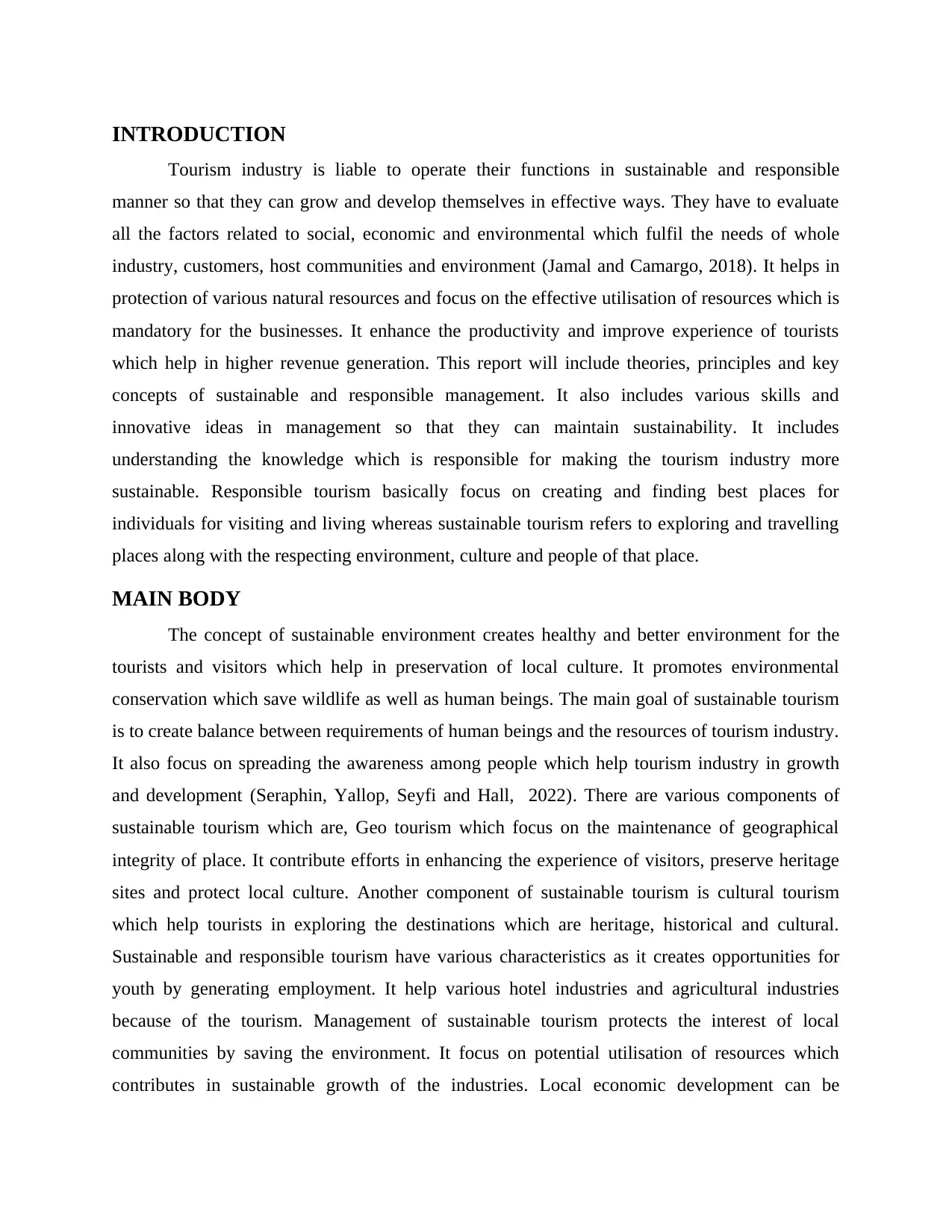
INTRODUCTION
Tourism industry is liable to operate their functions in sustainable and responsible
manner so that they can grow and develop themselves in effective ways. They have to evaluate
all the factors related to social, economic and environmental which fulfil the needs of whole
industry, customers, host communities and environment (Jamal and Camargo, 2018). It helps in
protection of various natural resources and focus on the effective utilisation of resources which is
mandatory for the businesses. It enhance the productivity and improve experience of tourists
which help in higher revenue generation. This report will include theories, principles and key
concepts of sustainable and responsible management. It also includes various skills and
innovative ideas in management so that they can maintain sustainability. It includes
understanding the knowledge which is responsible for making the tourism industry more
sustainable. Responsible tourism basically focus on creating and finding best places for
individuals for visiting and living whereas sustainable tourism refers to exploring and travelling
places along with the respecting environment, culture and people of that place.
MAIN BODY
The concept of sustainable environment creates healthy and better environment for the
tourists and visitors which help in preservation of local culture. It promotes environmental
conservation which save wildlife as well as human beings. The main goal of sustainable tourism
is to create balance between requirements of human beings and the resources of tourism industry.
It also focus on spreading the awareness among people which help tourism industry in growth
and development (Seraphin, Yallop, Seyfi and Hall, 2022). There are various components of
sustainable tourism which are, Geo tourism which focus on the maintenance of geographical
integrity of place. It contribute efforts in enhancing the experience of visitors, preserve heritage
sites and protect local culture. Another component of sustainable tourism is cultural tourism
which help tourists in exploring the destinations which are heritage, historical and cultural.
Sustainable and responsible tourism have various characteristics as it creates opportunities for
youth by generating employment. It help various hotel industries and agricultural industries
because of the tourism. Management of sustainable tourism protects the interest of local
communities by saving the environment. It focus on potential utilisation of resources which
contributes in sustainable growth of the industries. Local economic development can be
Tourism industry is liable to operate their functions in sustainable and responsible
manner so that they can grow and develop themselves in effective ways. They have to evaluate
all the factors related to social, economic and environmental which fulfil the needs of whole
industry, customers, host communities and environment (Jamal and Camargo, 2018). It helps in
protection of various natural resources and focus on the effective utilisation of resources which is
mandatory for the businesses. It enhance the productivity and improve experience of tourists
which help in higher revenue generation. This report will include theories, principles and key
concepts of sustainable and responsible management. It also includes various skills and
innovative ideas in management so that they can maintain sustainability. It includes
understanding the knowledge which is responsible for making the tourism industry more
sustainable. Responsible tourism basically focus on creating and finding best places for
individuals for visiting and living whereas sustainable tourism refers to exploring and travelling
places along with the respecting environment, culture and people of that place.
MAIN BODY
The concept of sustainable environment creates healthy and better environment for the
tourists and visitors which help in preservation of local culture. It promotes environmental
conservation which save wildlife as well as human beings. The main goal of sustainable tourism
is to create balance between requirements of human beings and the resources of tourism industry.
It also focus on spreading the awareness among people which help tourism industry in growth
and development (Seraphin, Yallop, Seyfi and Hall, 2022). There are various components of
sustainable tourism which are, Geo tourism which focus on the maintenance of geographical
integrity of place. It contribute efforts in enhancing the experience of visitors, preserve heritage
sites and protect local culture. Another component of sustainable tourism is cultural tourism
which help tourists in exploring the destinations which are heritage, historical and cultural.
Sustainable and responsible tourism have various characteristics as it creates opportunities for
youth by generating employment. It help various hotel industries and agricultural industries
because of the tourism. Management of sustainable tourism protects the interest of local
communities by saving the environment. It focus on potential utilisation of resources which
contributes in sustainable growth of the industries. Local economic development can be
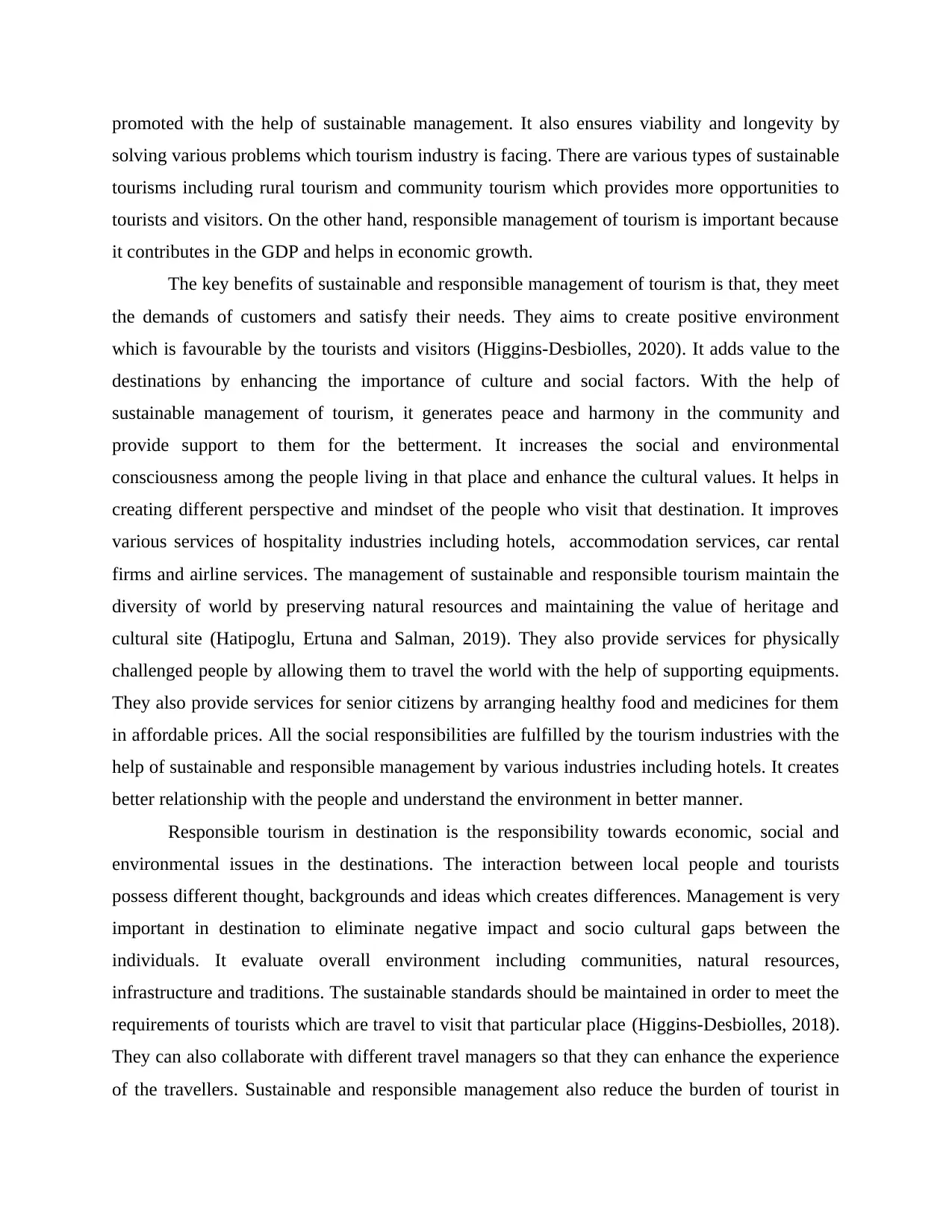
promoted with the help of sustainable management. It also ensures viability and longevity by
solving various problems which tourism industry is facing. There are various types of sustainable
tourisms including rural tourism and community tourism which provides more opportunities to
tourists and visitors. On the other hand, responsible management of tourism is important because
it contributes in the GDP and helps in economic growth.
The key benefits of sustainable and responsible management of tourism is that, they meet
the demands of customers and satisfy their needs. They aims to create positive environment
which is favourable by the tourists and visitors (Higgins-Desbiolles, 2020). It adds value to the
destinations by enhancing the importance of culture and social factors. With the help of
sustainable management of tourism, it generates peace and harmony in the community and
provide support to them for the betterment. It increases the social and environmental
consciousness among the people living in that place and enhance the cultural values. It helps in
creating different perspective and mindset of the people who visit that destination. It improves
various services of hospitality industries including hotels, accommodation services, car rental
firms and airline services. The management of sustainable and responsible tourism maintain the
diversity of world by preserving natural resources and maintaining the value of heritage and
cultural site (Hatipoglu, Ertuna and Salman, 2019). They also provide services for physically
challenged people by allowing them to travel the world with the help of supporting equipments.
They also provide services for senior citizens by arranging healthy food and medicines for them
in affordable prices. All the social responsibilities are fulfilled by the tourism industries with the
help of sustainable and responsible management by various industries including hotels. It creates
better relationship with the people and understand the environment in better manner.
Responsible tourism in destination is the responsibility towards economic, social and
environmental issues in the destinations. The interaction between local people and tourists
possess different thought, backgrounds and ideas which creates differences. Management is very
important in destination to eliminate negative impact and socio cultural gaps between the
individuals. It evaluate overall environment including communities, natural resources,
infrastructure and traditions. The sustainable standards should be maintained in order to meet the
requirements of tourists which are travel to visit that particular place (Higgins-Desbiolles, 2018).
They can also collaborate with different travel managers so that they can enhance the experience
of the travellers. Sustainable and responsible management also reduce the burden of tourist in
solving various problems which tourism industry is facing. There are various types of sustainable
tourisms including rural tourism and community tourism which provides more opportunities to
tourists and visitors. On the other hand, responsible management of tourism is important because
it contributes in the GDP and helps in economic growth.
The key benefits of sustainable and responsible management of tourism is that, they meet
the demands of customers and satisfy their needs. They aims to create positive environment
which is favourable by the tourists and visitors (Higgins-Desbiolles, 2020). It adds value to the
destinations by enhancing the importance of culture and social factors. With the help of
sustainable management of tourism, it generates peace and harmony in the community and
provide support to them for the betterment. It increases the social and environmental
consciousness among the people living in that place and enhance the cultural values. It helps in
creating different perspective and mindset of the people who visit that destination. It improves
various services of hospitality industries including hotels, accommodation services, car rental
firms and airline services. The management of sustainable and responsible tourism maintain the
diversity of world by preserving natural resources and maintaining the value of heritage and
cultural site (Hatipoglu, Ertuna and Salman, 2019). They also provide services for physically
challenged people by allowing them to travel the world with the help of supporting equipments.
They also provide services for senior citizens by arranging healthy food and medicines for them
in affordable prices. All the social responsibilities are fulfilled by the tourism industries with the
help of sustainable and responsible management by various industries including hotels. It creates
better relationship with the people and understand the environment in better manner.
Responsible tourism in destination is the responsibility towards economic, social and
environmental issues in the destinations. The interaction between local people and tourists
possess different thought, backgrounds and ideas which creates differences. Management is very
important in destination to eliminate negative impact and socio cultural gaps between the
individuals. It evaluate overall environment including communities, natural resources,
infrastructure and traditions. The sustainable standards should be maintained in order to meet the
requirements of tourists which are travel to visit that particular place (Higgins-Desbiolles, 2018).
They can also collaborate with different travel managers so that they can enhance the experience
of the travellers. Sustainable and responsible management also reduce the burden of tourist in
Secure Best Marks with AI Grader
Need help grading? Try our AI Grader for instant feedback on your assignments.
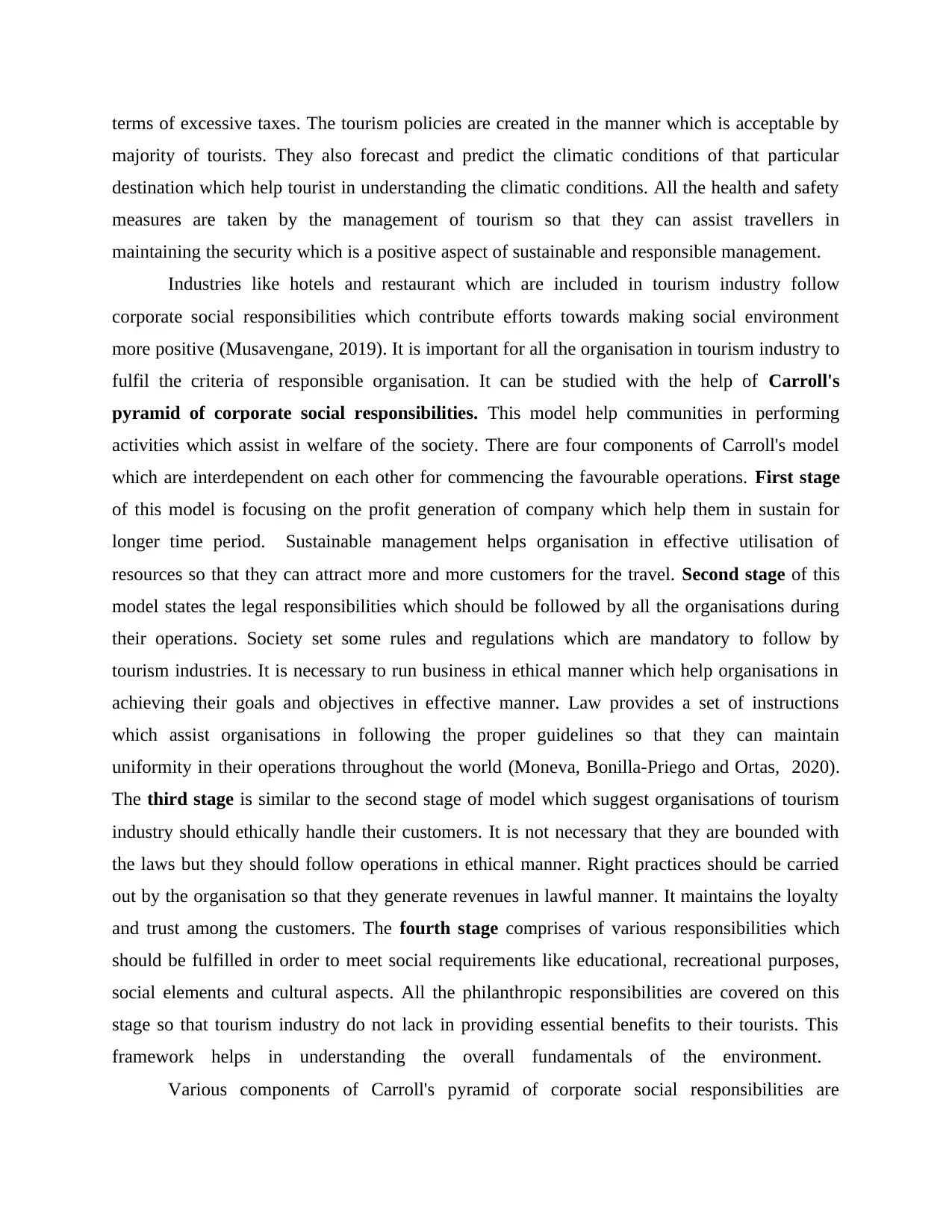
terms of excessive taxes. The tourism policies are created in the manner which is acceptable by
majority of tourists. They also forecast and predict the climatic conditions of that particular
destination which help tourist in understanding the climatic conditions. All the health and safety
measures are taken by the management of tourism so that they can assist travellers in
maintaining the security which is a positive aspect of sustainable and responsible management.
Industries like hotels and restaurant which are included in tourism industry follow
corporate social responsibilities which contribute efforts towards making social environment
more positive (Musavengane, 2019). It is important for all the organisation in tourism industry to
fulfil the criteria of responsible organisation. It can be studied with the help of Carroll's
pyramid of corporate social responsibilities. This model help communities in performing
activities which assist in welfare of the society. There are four components of Carroll's model
which are interdependent on each other for commencing the favourable operations. First stage
of this model is focusing on the profit generation of company which help them in sustain for
longer time period. Sustainable management helps organisation in effective utilisation of
resources so that they can attract more and more customers for the travel. Second stage of this
model states the legal responsibilities which should be followed by all the organisations during
their operations. Society set some rules and regulations which are mandatory to follow by
tourism industries. It is necessary to run business in ethical manner which help organisations in
achieving their goals and objectives in effective manner. Law provides a set of instructions
which assist organisations in following the proper guidelines so that they can maintain
uniformity in their operations throughout the world (Moneva, Bonilla-Priego and Ortas, 2020).
The third stage is similar to the second stage of model which suggest organisations of tourism
industry should ethically handle their customers. It is not necessary that they are bounded with
the laws but they should follow operations in ethical manner. Right practices should be carried
out by the organisation so that they generate revenues in lawful manner. It maintains the loyalty
and trust among the customers. The fourth stage comprises of various responsibilities which
should be fulfilled in order to meet social requirements like educational, recreational purposes,
social elements and cultural aspects. All the philanthropic responsibilities are covered on this
stage so that tourism industry do not lack in providing essential benefits to their tourists. This
framework helps in understanding the overall fundamentals of the environment.
Various components of Carroll's pyramid of corporate social responsibilities are
majority of tourists. They also forecast and predict the climatic conditions of that particular
destination which help tourist in understanding the climatic conditions. All the health and safety
measures are taken by the management of tourism so that they can assist travellers in
maintaining the security which is a positive aspect of sustainable and responsible management.
Industries like hotels and restaurant which are included in tourism industry follow
corporate social responsibilities which contribute efforts towards making social environment
more positive (Musavengane, 2019). It is important for all the organisation in tourism industry to
fulfil the criteria of responsible organisation. It can be studied with the help of Carroll's
pyramid of corporate social responsibilities. This model help communities in performing
activities which assist in welfare of the society. There are four components of Carroll's model
which are interdependent on each other for commencing the favourable operations. First stage
of this model is focusing on the profit generation of company which help them in sustain for
longer time period. Sustainable management helps organisation in effective utilisation of
resources so that they can attract more and more customers for the travel. Second stage of this
model states the legal responsibilities which should be followed by all the organisations during
their operations. Society set some rules and regulations which are mandatory to follow by
tourism industries. It is necessary to run business in ethical manner which help organisations in
achieving their goals and objectives in effective manner. Law provides a set of instructions
which assist organisations in following the proper guidelines so that they can maintain
uniformity in their operations throughout the world (Moneva, Bonilla-Priego and Ortas, 2020).
The third stage is similar to the second stage of model which suggest organisations of tourism
industry should ethically handle their customers. It is not necessary that they are bounded with
the laws but they should follow operations in ethical manner. Right practices should be carried
out by the organisation so that they generate revenues in lawful manner. It maintains the loyalty
and trust among the customers. The fourth stage comprises of various responsibilities which
should be fulfilled in order to meet social requirements like educational, recreational purposes,
social elements and cultural aspects. All the philanthropic responsibilities are covered on this
stage so that tourism industry do not lack in providing essential benefits to their tourists. This
framework helps in understanding the overall fundamentals of the environment.
Various components of Carroll's pyramid of corporate social responsibilities are
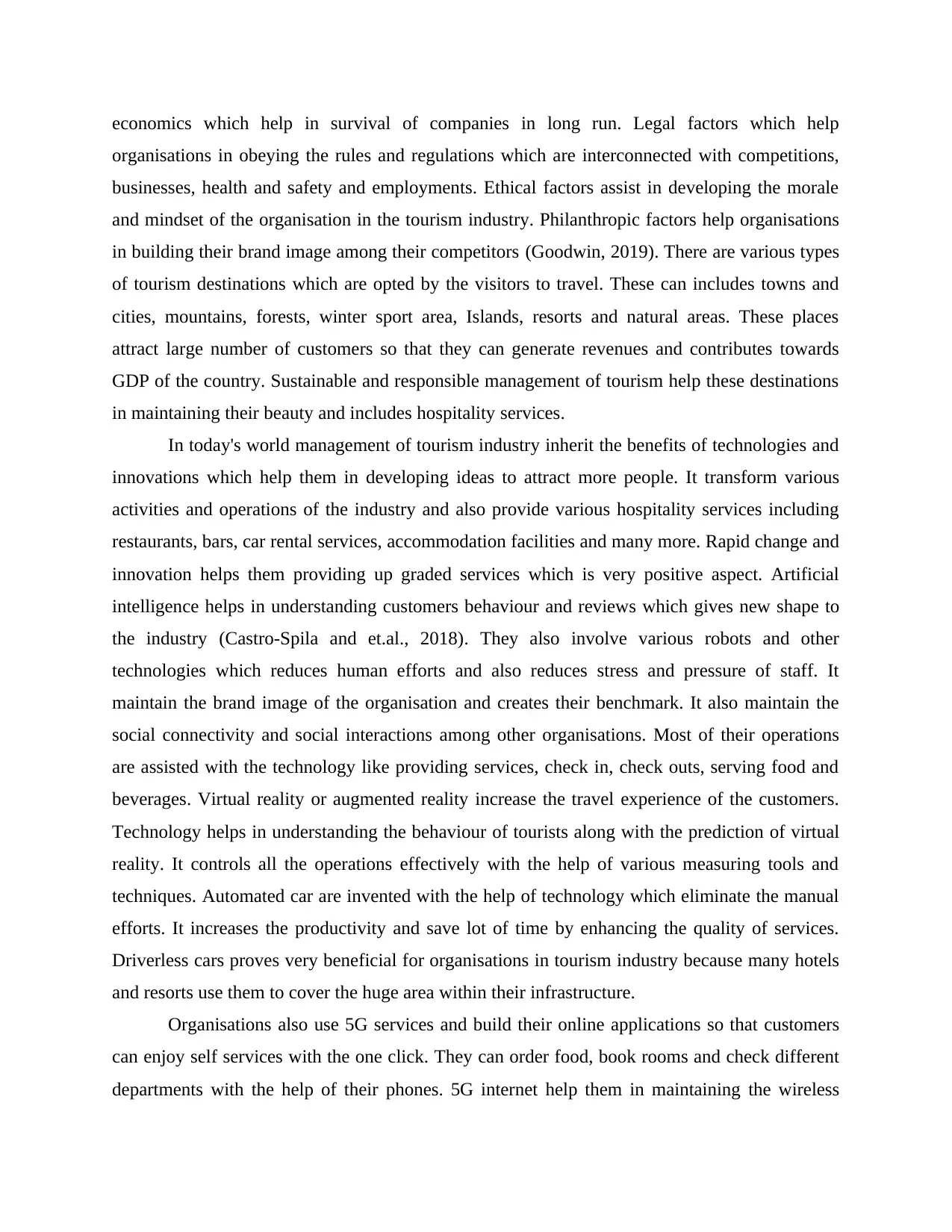
economics which help in survival of companies in long run. Legal factors which help
organisations in obeying the rules and regulations which are interconnected with competitions,
businesses, health and safety and employments. Ethical factors assist in developing the morale
and mindset of the organisation in the tourism industry. Philanthropic factors help organisations
in building their brand image among their competitors (Goodwin, 2019). There are various types
of tourism destinations which are opted by the visitors to travel. These can includes towns and
cities, mountains, forests, winter sport area, Islands, resorts and natural areas. These places
attract large number of customers so that they can generate revenues and contributes towards
GDP of the country. Sustainable and responsible management of tourism help these destinations
in maintaining their beauty and includes hospitality services.
In today's world management of tourism industry inherit the benefits of technologies and
innovations which help them in developing ideas to attract more people. It transform various
activities and operations of the industry and also provide various hospitality services including
restaurants, bars, car rental services, accommodation facilities and many more. Rapid change and
innovation helps them providing up graded services which is very positive aspect. Artificial
intelligence helps in understanding customers behaviour and reviews which gives new shape to
the industry (Castro-Spila and et.al., 2018). They also involve various robots and other
technologies which reduces human efforts and also reduces stress and pressure of staff. It
maintain the brand image of the organisation and creates their benchmark. It also maintain the
social connectivity and social interactions among other organisations. Most of their operations
are assisted with the technology like providing services, check in, check outs, serving food and
beverages. Virtual reality or augmented reality increase the travel experience of the customers.
Technology helps in understanding the behaviour of tourists along with the prediction of virtual
reality. It controls all the operations effectively with the help of various measuring tools and
techniques. Automated car are invented with the help of technology which eliminate the manual
efforts. It increases the productivity and save lot of time by enhancing the quality of services.
Driverless cars proves very beneficial for organisations in tourism industry because many hotels
and resorts use them to cover the huge area within their infrastructure.
Organisations also use 5G services and build their online applications so that customers
can enjoy self services with the one click. They can order food, book rooms and check different
departments with the help of their phones. 5G internet help them in maintaining the wireless
organisations in obeying the rules and regulations which are interconnected with competitions,
businesses, health and safety and employments. Ethical factors assist in developing the morale
and mindset of the organisation in the tourism industry. Philanthropic factors help organisations
in building their brand image among their competitors (Goodwin, 2019). There are various types
of tourism destinations which are opted by the visitors to travel. These can includes towns and
cities, mountains, forests, winter sport area, Islands, resorts and natural areas. These places
attract large number of customers so that they can generate revenues and contributes towards
GDP of the country. Sustainable and responsible management of tourism help these destinations
in maintaining their beauty and includes hospitality services.
In today's world management of tourism industry inherit the benefits of technologies and
innovations which help them in developing ideas to attract more people. It transform various
activities and operations of the industry and also provide various hospitality services including
restaurants, bars, car rental services, accommodation facilities and many more. Rapid change and
innovation helps them providing up graded services which is very positive aspect. Artificial
intelligence helps in understanding customers behaviour and reviews which gives new shape to
the industry (Castro-Spila and et.al., 2018). They also involve various robots and other
technologies which reduces human efforts and also reduces stress and pressure of staff. It
maintain the brand image of the organisation and creates their benchmark. It also maintain the
social connectivity and social interactions among other organisations. Most of their operations
are assisted with the technology like providing services, check in, check outs, serving food and
beverages. Virtual reality or augmented reality increase the travel experience of the customers.
Technology helps in understanding the behaviour of tourists along with the prediction of virtual
reality. It controls all the operations effectively with the help of various measuring tools and
techniques. Automated car are invented with the help of technology which eliminate the manual
efforts. It increases the productivity and save lot of time by enhancing the quality of services.
Driverless cars proves very beneficial for organisations in tourism industry because many hotels
and resorts use them to cover the huge area within their infrastructure.
Organisations also use 5G services and build their online applications so that customers
can enjoy self services with the one click. They can order food, book rooms and check different
departments with the help of their phones. 5G internet help them in maintaining the wireless
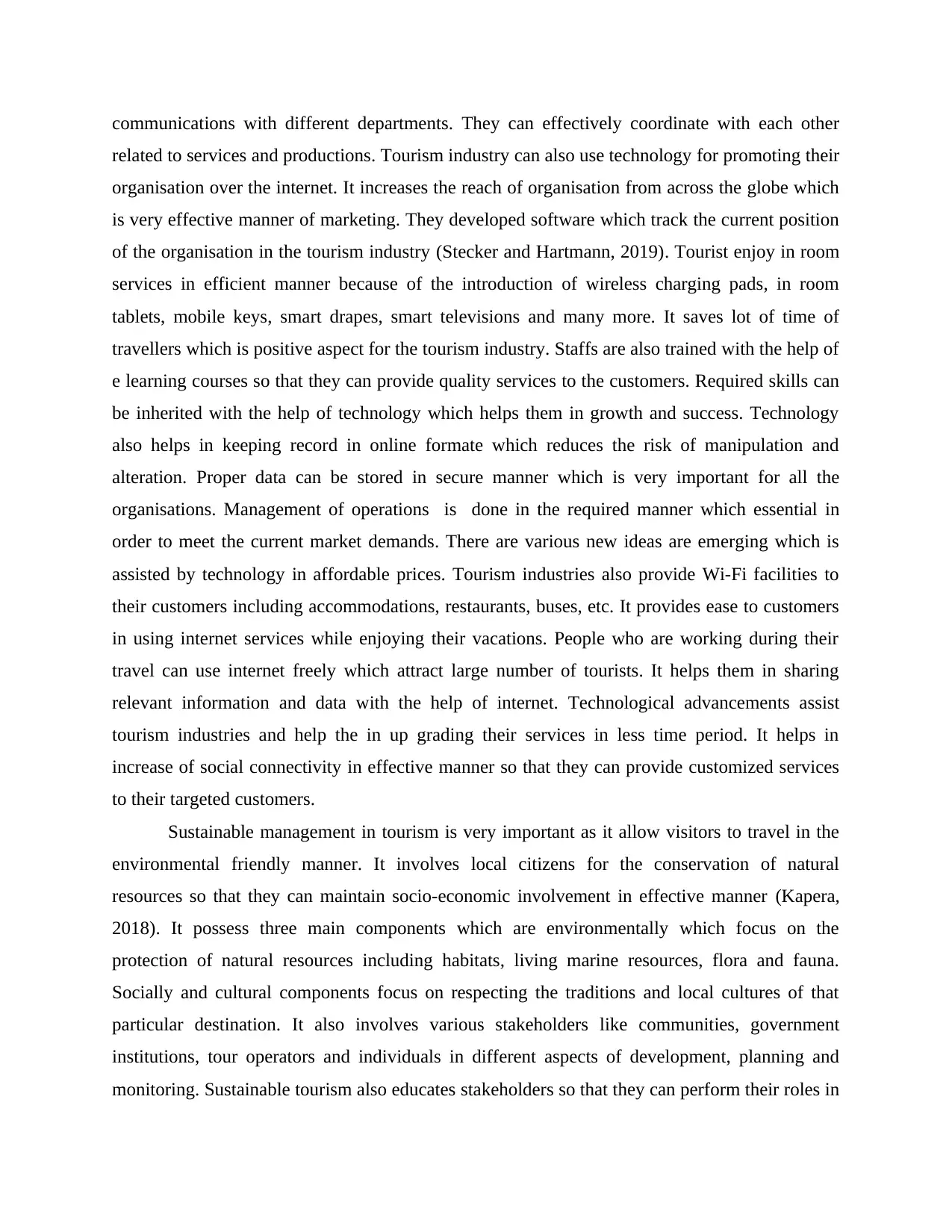
communications with different departments. They can effectively coordinate with each other
related to services and productions. Tourism industry can also use technology for promoting their
organisation over the internet. It increases the reach of organisation from across the globe which
is very effective manner of marketing. They developed software which track the current position
of the organisation in the tourism industry (Stecker and Hartmann, 2019). Tourist enjoy in room
services in efficient manner because of the introduction of wireless charging pads, in room
tablets, mobile keys, smart drapes, smart televisions and many more. It saves lot of time of
travellers which is positive aspect for the tourism industry. Staffs are also trained with the help of
e learning courses so that they can provide quality services to the customers. Required skills can
be inherited with the help of technology which helps them in growth and success. Technology
also helps in keeping record in online formate which reduces the risk of manipulation and
alteration. Proper data can be stored in secure manner which is very important for all the
organisations. Management of operations is done in the required manner which essential in
order to meet the current market demands. There are various new ideas are emerging which is
assisted by technology in affordable prices. Tourism industries also provide Wi-Fi facilities to
their customers including accommodations, restaurants, buses, etc. It provides ease to customers
in using internet services while enjoying their vacations. People who are working during their
travel can use internet freely which attract large number of tourists. It helps them in sharing
relevant information and data with the help of internet. Technological advancements assist
tourism industries and help the in up grading their services in less time period. It helps in
increase of social connectivity in effective manner so that they can provide customized services
to their targeted customers.
Sustainable management in tourism is very important as it allow visitors to travel in the
environmental friendly manner. It involves local citizens for the conservation of natural
resources so that they can maintain socio-economic involvement in effective manner (Kapera,
2018). It possess three main components which are environmentally which focus on the
protection of natural resources including habitats, living marine resources, flora and fauna.
Socially and cultural components focus on respecting the traditions and local cultures of that
particular destination. It also involves various stakeholders like communities, government
institutions, tour operators and individuals in different aspects of development, planning and
monitoring. Sustainable tourism also educates stakeholders so that they can perform their roles in
related to services and productions. Tourism industry can also use technology for promoting their
organisation over the internet. It increases the reach of organisation from across the globe which
is very effective manner of marketing. They developed software which track the current position
of the organisation in the tourism industry (Stecker and Hartmann, 2019). Tourist enjoy in room
services in efficient manner because of the introduction of wireless charging pads, in room
tablets, mobile keys, smart drapes, smart televisions and many more. It saves lot of time of
travellers which is positive aspect for the tourism industry. Staffs are also trained with the help of
e learning courses so that they can provide quality services to the customers. Required skills can
be inherited with the help of technology which helps them in growth and success. Technology
also helps in keeping record in online formate which reduces the risk of manipulation and
alteration. Proper data can be stored in secure manner which is very important for all the
organisations. Management of operations is done in the required manner which essential in
order to meet the current market demands. There are various new ideas are emerging which is
assisted by technology in affordable prices. Tourism industries also provide Wi-Fi facilities to
their customers including accommodations, restaurants, buses, etc. It provides ease to customers
in using internet services while enjoying their vacations. People who are working during their
travel can use internet freely which attract large number of tourists. It helps them in sharing
relevant information and data with the help of internet. Technological advancements assist
tourism industries and help the in up grading their services in less time period. It helps in
increase of social connectivity in effective manner so that they can provide customized services
to their targeted customers.
Sustainable management in tourism is very important as it allow visitors to travel in the
environmental friendly manner. It involves local citizens for the conservation of natural
resources so that they can maintain socio-economic involvement in effective manner (Kapera,
2018). It possess three main components which are environmentally which focus on the
protection of natural resources including habitats, living marine resources, flora and fauna.
Socially and cultural components focus on respecting the traditions and local cultures of that
particular destination. It also involves various stakeholders like communities, government
institutions, tour operators and individuals in different aspects of development, planning and
monitoring. Sustainable tourism also educates stakeholders so that they can perform their roles in
Paraphrase This Document
Need a fresh take? Get an instant paraphrase of this document with our AI Paraphraser
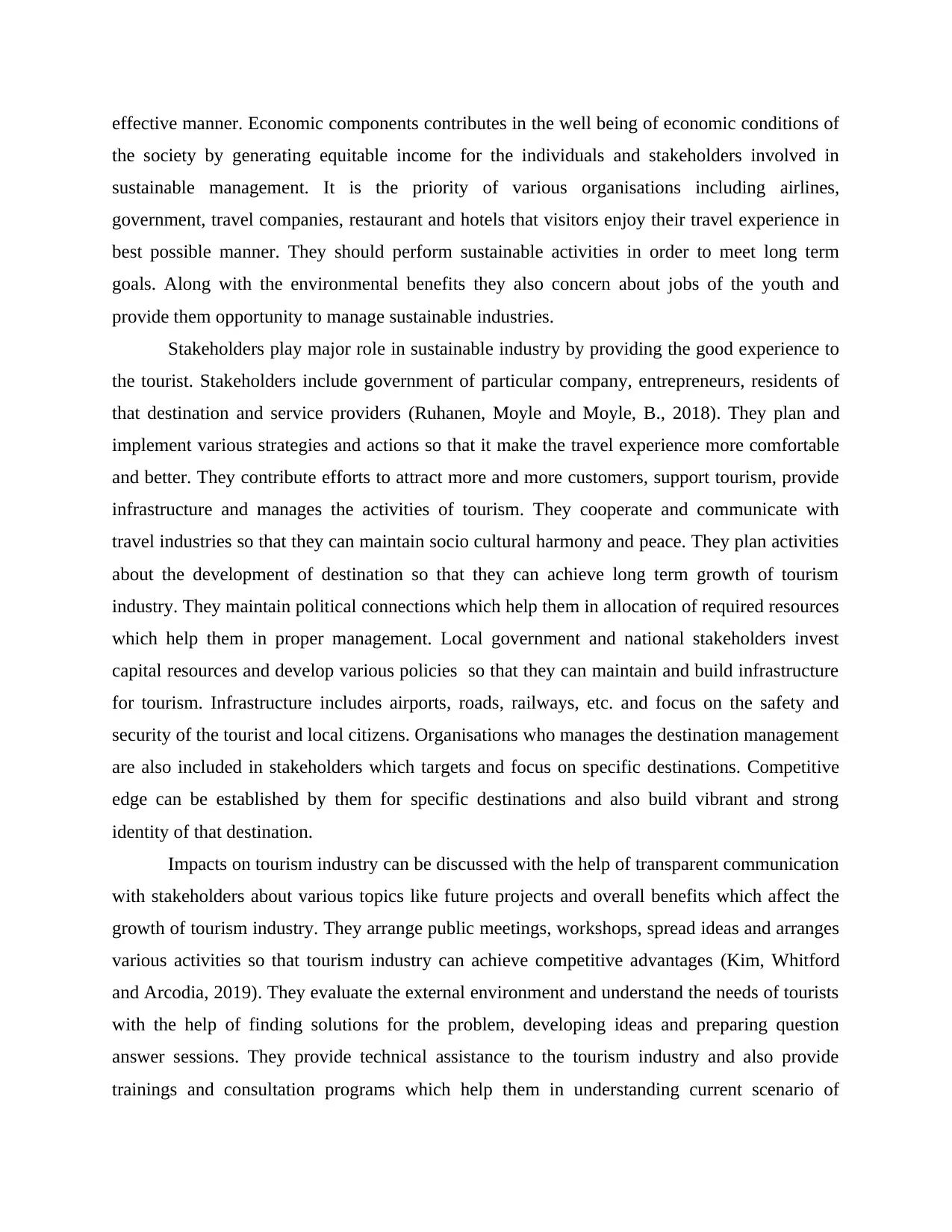
effective manner. Economic components contributes in the well being of economic conditions of
the society by generating equitable income for the individuals and stakeholders involved in
sustainable management. It is the priority of various organisations including airlines,
government, travel companies, restaurant and hotels that visitors enjoy their travel experience in
best possible manner. They should perform sustainable activities in order to meet long term
goals. Along with the environmental benefits they also concern about jobs of the youth and
provide them opportunity to manage sustainable industries.
Stakeholders play major role in sustainable industry by providing the good experience to
the tourist. Stakeholders include government of particular company, entrepreneurs, residents of
that destination and service providers (Ruhanen, Moyle and Moyle, B., 2018). They plan and
implement various strategies and actions so that it make the travel experience more comfortable
and better. They contribute efforts to attract more and more customers, support tourism, provide
infrastructure and manages the activities of tourism. They cooperate and communicate with
travel industries so that they can maintain socio cultural harmony and peace. They plan activities
about the development of destination so that they can achieve long term growth of tourism
industry. They maintain political connections which help them in allocation of required resources
which help them in proper management. Local government and national stakeholders invest
capital resources and develop various policies so that they can maintain and build infrastructure
for tourism. Infrastructure includes airports, roads, railways, etc. and focus on the safety and
security of the tourist and local citizens. Organisations who manages the destination management
are also included in stakeholders which targets and focus on specific destinations. Competitive
edge can be established by them for specific destinations and also build vibrant and strong
identity of that destination.
Impacts on tourism industry can be discussed with the help of transparent communication
with stakeholders about various topics like future projects and overall benefits which affect the
growth of tourism industry. They arrange public meetings, workshops, spread ideas and arranges
various activities so that tourism industry can achieve competitive advantages (Kim, Whitford
and Arcodia, 2019). They evaluate the external environment and understand the needs of tourists
with the help of finding solutions for the problem, developing ideas and preparing question
answer sessions. They provide technical assistance to the tourism industry and also provide
trainings and consultation programs which help them in understanding current scenario of
the society by generating equitable income for the individuals and stakeholders involved in
sustainable management. It is the priority of various organisations including airlines,
government, travel companies, restaurant and hotels that visitors enjoy their travel experience in
best possible manner. They should perform sustainable activities in order to meet long term
goals. Along with the environmental benefits they also concern about jobs of the youth and
provide them opportunity to manage sustainable industries.
Stakeholders play major role in sustainable industry by providing the good experience to
the tourist. Stakeholders include government of particular company, entrepreneurs, residents of
that destination and service providers (Ruhanen, Moyle and Moyle, B., 2018). They plan and
implement various strategies and actions so that it make the travel experience more comfortable
and better. They contribute efforts to attract more and more customers, support tourism, provide
infrastructure and manages the activities of tourism. They cooperate and communicate with
travel industries so that they can maintain socio cultural harmony and peace. They plan activities
about the development of destination so that they can achieve long term growth of tourism
industry. They maintain political connections which help them in allocation of required resources
which help them in proper management. Local government and national stakeholders invest
capital resources and develop various policies so that they can maintain and build infrastructure
for tourism. Infrastructure includes airports, roads, railways, etc. and focus on the safety and
security of the tourist and local citizens. Organisations who manages the destination management
are also included in stakeholders which targets and focus on specific destinations. Competitive
edge can be established by them for specific destinations and also build vibrant and strong
identity of that destination.
Impacts on tourism industry can be discussed with the help of transparent communication
with stakeholders about various topics like future projects and overall benefits which affect the
growth of tourism industry. They arrange public meetings, workshops, spread ideas and arranges
various activities so that tourism industry can achieve competitive advantages (Kim, Whitford
and Arcodia, 2019). They evaluate the external environment and understand the needs of tourists
with the help of finding solutions for the problem, developing ideas and preparing question
answer sessions. They provide technical assistance to the tourism industry and also provide
trainings and consultation programs which help them in understanding current scenario of
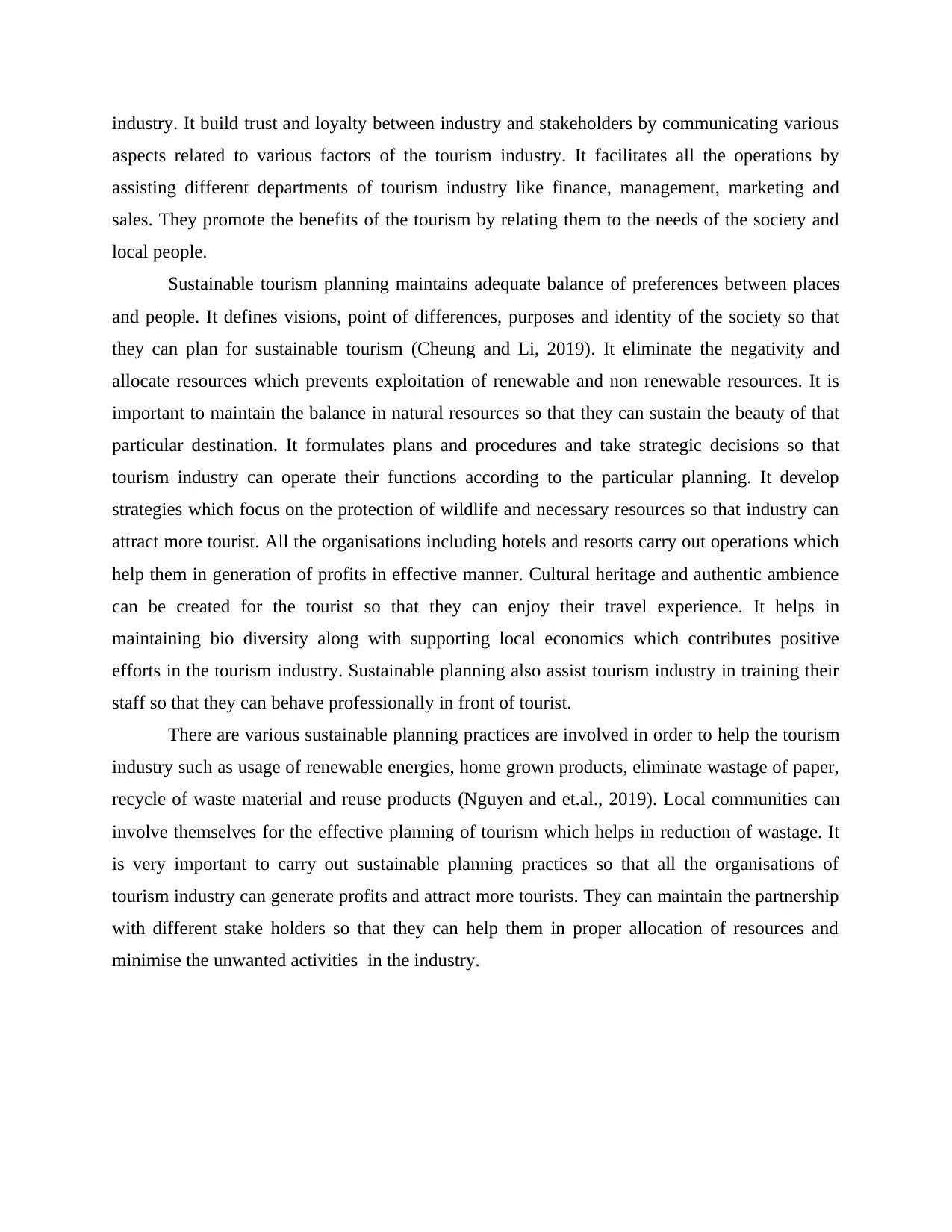
industry. It build trust and loyalty between industry and stakeholders by communicating various
aspects related to various factors of the tourism industry. It facilitates all the operations by
assisting different departments of tourism industry like finance, management, marketing and
sales. They promote the benefits of the tourism by relating them to the needs of the society and
local people.
Sustainable tourism planning maintains adequate balance of preferences between places
and people. It defines visions, point of differences, purposes and identity of the society so that
they can plan for sustainable tourism (Cheung and Li, 2019). It eliminate the negativity and
allocate resources which prevents exploitation of renewable and non renewable resources. It is
important to maintain the balance in natural resources so that they can sustain the beauty of that
particular destination. It formulates plans and procedures and take strategic decisions so that
tourism industry can operate their functions according to the particular planning. It develop
strategies which focus on the protection of wildlife and necessary resources so that industry can
attract more tourist. All the organisations including hotels and resorts carry out operations which
help them in generation of profits in effective manner. Cultural heritage and authentic ambience
can be created for the tourist so that they can enjoy their travel experience. It helps in
maintaining bio diversity along with supporting local economics which contributes positive
efforts in the tourism industry. Sustainable planning also assist tourism industry in training their
staff so that they can behave professionally in front of tourist.
There are various sustainable planning practices are involved in order to help the tourism
industry such as usage of renewable energies, home grown products, eliminate wastage of paper,
recycle of waste material and reuse products (Nguyen and et.al., 2019). Local communities can
involve themselves for the effective planning of tourism which helps in reduction of wastage. It
is very important to carry out sustainable planning practices so that all the organisations of
tourism industry can generate profits and attract more tourists. They can maintain the partnership
with different stake holders so that they can help them in proper allocation of resources and
minimise the unwanted activities in the industry.
aspects related to various factors of the tourism industry. It facilitates all the operations by
assisting different departments of tourism industry like finance, management, marketing and
sales. They promote the benefits of the tourism by relating them to the needs of the society and
local people.
Sustainable tourism planning maintains adequate balance of preferences between places
and people. It defines visions, point of differences, purposes and identity of the society so that
they can plan for sustainable tourism (Cheung and Li, 2019). It eliminate the negativity and
allocate resources which prevents exploitation of renewable and non renewable resources. It is
important to maintain the balance in natural resources so that they can sustain the beauty of that
particular destination. It formulates plans and procedures and take strategic decisions so that
tourism industry can operate their functions according to the particular planning. It develop
strategies which focus on the protection of wildlife and necessary resources so that industry can
attract more tourist. All the organisations including hotels and resorts carry out operations which
help them in generation of profits in effective manner. Cultural heritage and authentic ambience
can be created for the tourist so that they can enjoy their travel experience. It helps in
maintaining bio diversity along with supporting local economics which contributes positive
efforts in the tourism industry. Sustainable planning also assist tourism industry in training their
staff so that they can behave professionally in front of tourist.
There are various sustainable planning practices are involved in order to help the tourism
industry such as usage of renewable energies, home grown products, eliminate wastage of paper,
recycle of waste material and reuse products (Nguyen and et.al., 2019). Local communities can
involve themselves for the effective planning of tourism which helps in reduction of wastage. It
is very important to carry out sustainable planning practices so that all the organisations of
tourism industry can generate profits and attract more tourists. They can maintain the partnership
with different stake holders so that they can help them in proper allocation of resources and
minimise the unwanted activities in the industry.
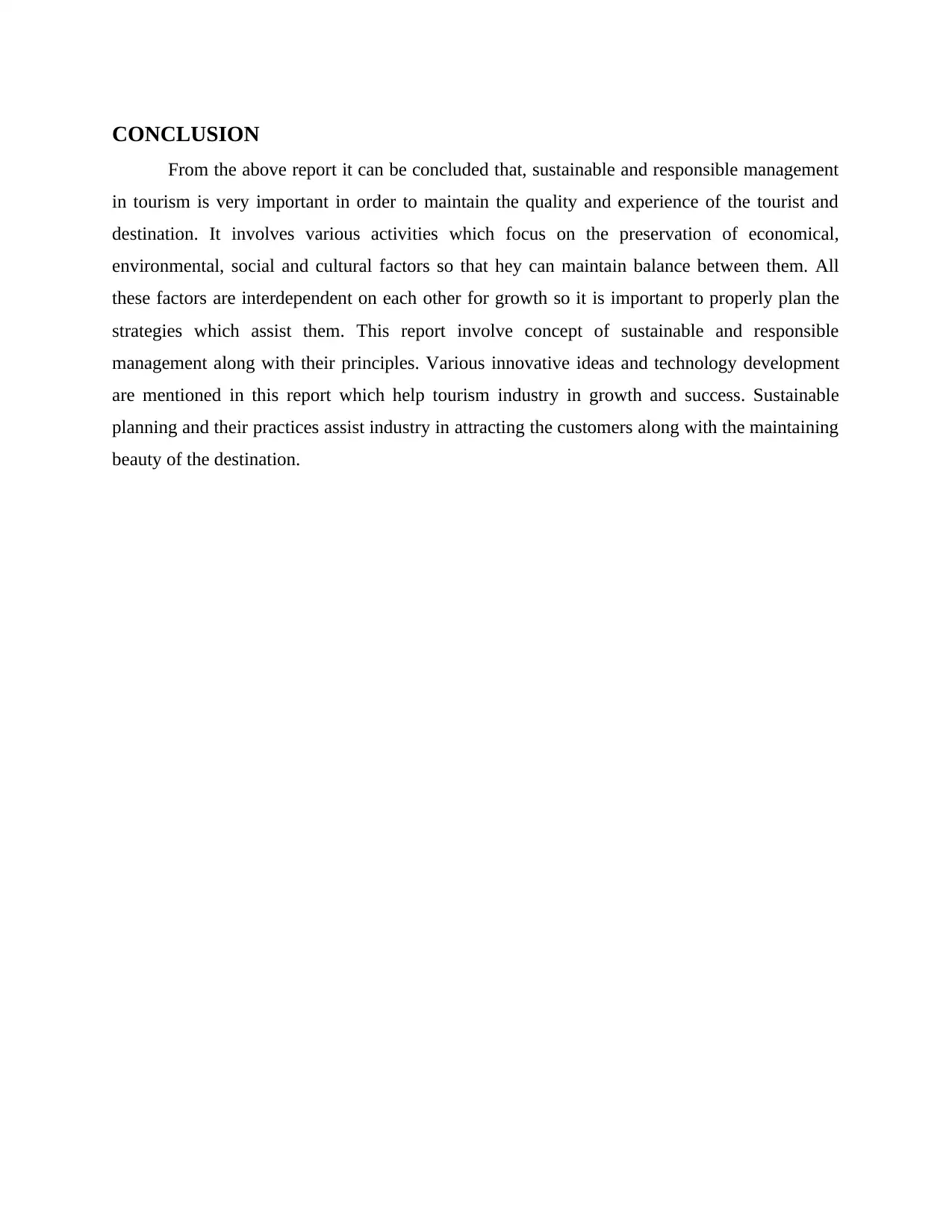
CONCLUSION
From the above report it can be concluded that, sustainable and responsible management
in tourism is very important in order to maintain the quality and experience of the tourist and
destination. It involves various activities which focus on the preservation of economical,
environmental, social and cultural factors so that hey can maintain balance between them. All
these factors are interdependent on each other for growth so it is important to properly plan the
strategies which assist them. This report involve concept of sustainable and responsible
management along with their principles. Various innovative ideas and technology development
are mentioned in this report which help tourism industry in growth and success. Sustainable
planning and their practices assist industry in attracting the customers along with the maintaining
beauty of the destination.
From the above report it can be concluded that, sustainable and responsible management
in tourism is very important in order to maintain the quality and experience of the tourist and
destination. It involves various activities which focus on the preservation of economical,
environmental, social and cultural factors so that hey can maintain balance between them. All
these factors are interdependent on each other for growth so it is important to properly plan the
strategies which assist them. This report involve concept of sustainable and responsible
management along with their principles. Various innovative ideas and technology development
are mentioned in this report which help tourism industry in growth and success. Sustainable
planning and their practices assist industry in attracting the customers along with the maintaining
beauty of the destination.
Secure Best Marks with AI Grader
Need help grading? Try our AI Grader for instant feedback on your assignments.
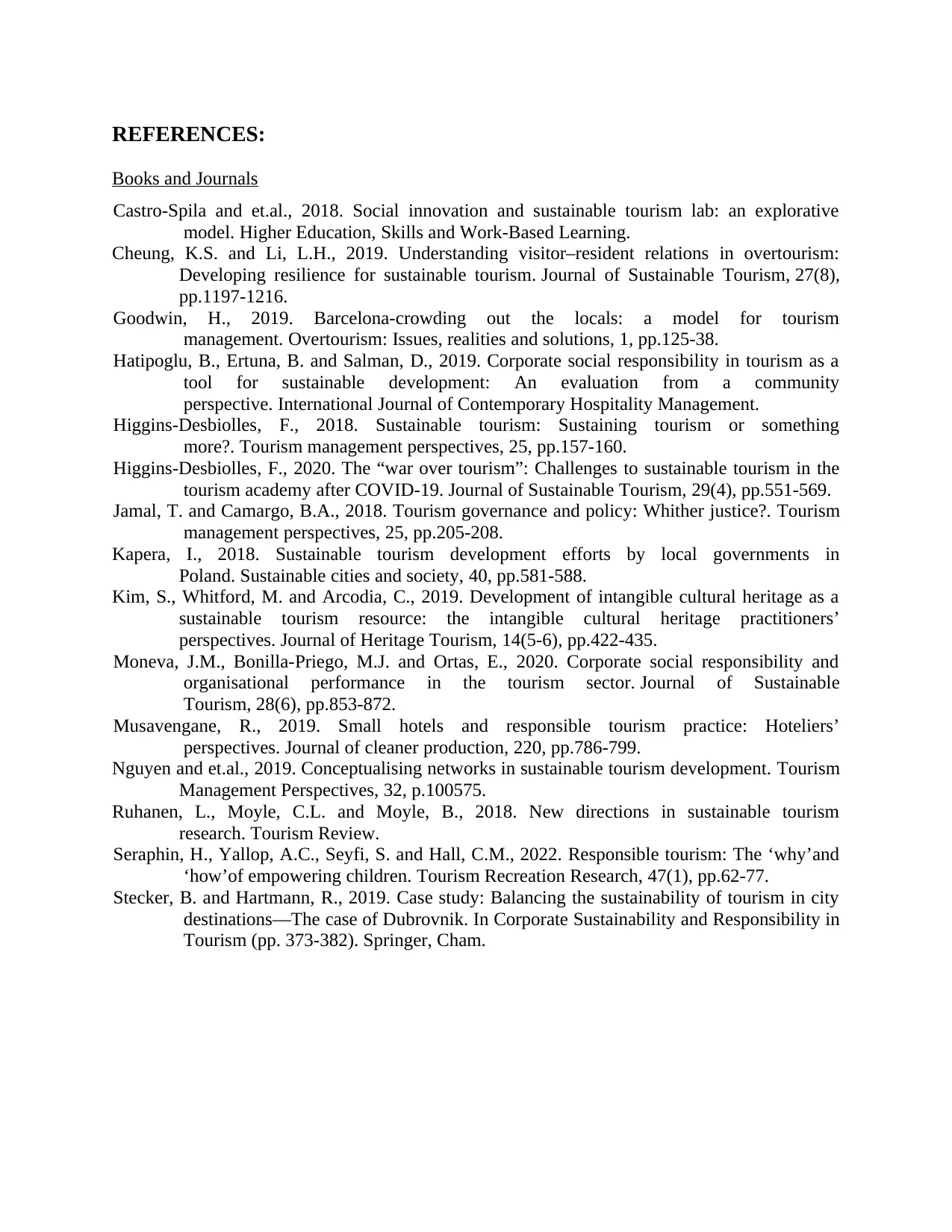
REFERENCES:
Books and Journals
Castro-Spila and et.al., 2018. Social innovation and sustainable tourism lab: an explorative
model. Higher Education, Skills and Work-Based Learning.
Cheung, K.S. and Li, L.H., 2019. Understanding visitor–resident relations in overtourism:
Developing resilience for sustainable tourism. Journal of Sustainable Tourism, 27(8),
pp.1197-1216.
Goodwin, H., 2019. Barcelona-crowding out the locals: a model for tourism
management. Overtourism: Issues, realities and solutions, 1, pp.125-38.
Hatipoglu, B., Ertuna, B. and Salman, D., 2019. Corporate social responsibility in tourism as a
tool for sustainable development: An evaluation from a community
perspective. International Journal of Contemporary Hospitality Management.
Higgins-Desbiolles, F., 2018. Sustainable tourism: Sustaining tourism or something
more?. Tourism management perspectives, 25, pp.157-160.
Higgins-Desbiolles, F., 2020. The “war over tourism”: Challenges to sustainable tourism in the
tourism academy after COVID-19. Journal of Sustainable Tourism, 29(4), pp.551-569.
Jamal, T. and Camargo, B.A., 2018. Tourism governance and policy: Whither justice?. Tourism
management perspectives, 25, pp.205-208.
Kapera, I., 2018. Sustainable tourism development efforts by local governments in
Poland. Sustainable cities and society, 40, pp.581-588.
Kim, S., Whitford, M. and Arcodia, C., 2019. Development of intangible cultural heritage as a
sustainable tourism resource: the intangible cultural heritage practitioners’
perspectives. Journal of Heritage Tourism, 14(5-6), pp.422-435.
Moneva, J.M., Bonilla-Priego, M.J. and Ortas, E., 2020. Corporate social responsibility and
organisational performance in the tourism sector. Journal of Sustainable
Tourism, 28(6), pp.853-872.
Musavengane, R., 2019. Small hotels and responsible tourism practice: Hoteliers’
perspectives. Journal of cleaner production, 220, pp.786-799.
Nguyen and et.al., 2019. Conceptualising networks in sustainable tourism development. Tourism
Management Perspectives, 32, p.100575.
Ruhanen, L., Moyle, C.L. and Moyle, B., 2018. New directions in sustainable tourism
research. Tourism Review.
Seraphin, H., Yallop, A.C., Seyfi, S. and Hall, C.M., 2022. Responsible tourism: The ‘why’and
‘how’of empowering children. Tourism Recreation Research, 47(1), pp.62-77.
Stecker, B. and Hartmann, R., 2019. Case study: Balancing the sustainability of tourism in city
destinations—The case of Dubrovnik. In Corporate Sustainability and Responsibility in
Tourism (pp. 373-382). Springer, Cham.
Books and Journals
Castro-Spila and et.al., 2018. Social innovation and sustainable tourism lab: an explorative
model. Higher Education, Skills and Work-Based Learning.
Cheung, K.S. and Li, L.H., 2019. Understanding visitor–resident relations in overtourism:
Developing resilience for sustainable tourism. Journal of Sustainable Tourism, 27(8),
pp.1197-1216.
Goodwin, H., 2019. Barcelona-crowding out the locals: a model for tourism
management. Overtourism: Issues, realities and solutions, 1, pp.125-38.
Hatipoglu, B., Ertuna, B. and Salman, D., 2019. Corporate social responsibility in tourism as a
tool for sustainable development: An evaluation from a community
perspective. International Journal of Contemporary Hospitality Management.
Higgins-Desbiolles, F., 2018. Sustainable tourism: Sustaining tourism or something
more?. Tourism management perspectives, 25, pp.157-160.
Higgins-Desbiolles, F., 2020. The “war over tourism”: Challenges to sustainable tourism in the
tourism academy after COVID-19. Journal of Sustainable Tourism, 29(4), pp.551-569.
Jamal, T. and Camargo, B.A., 2018. Tourism governance and policy: Whither justice?. Tourism
management perspectives, 25, pp.205-208.
Kapera, I., 2018. Sustainable tourism development efforts by local governments in
Poland. Sustainable cities and society, 40, pp.581-588.
Kim, S., Whitford, M. and Arcodia, C., 2019. Development of intangible cultural heritage as a
sustainable tourism resource: the intangible cultural heritage practitioners’
perspectives. Journal of Heritage Tourism, 14(5-6), pp.422-435.
Moneva, J.M., Bonilla-Priego, M.J. and Ortas, E., 2020. Corporate social responsibility and
organisational performance in the tourism sector. Journal of Sustainable
Tourism, 28(6), pp.853-872.
Musavengane, R., 2019. Small hotels and responsible tourism practice: Hoteliers’
perspectives. Journal of cleaner production, 220, pp.786-799.
Nguyen and et.al., 2019. Conceptualising networks in sustainable tourism development. Tourism
Management Perspectives, 32, p.100575.
Ruhanen, L., Moyle, C.L. and Moyle, B., 2018. New directions in sustainable tourism
research. Tourism Review.
Seraphin, H., Yallop, A.C., Seyfi, S. and Hall, C.M., 2022. Responsible tourism: The ‘why’and
‘how’of empowering children. Tourism Recreation Research, 47(1), pp.62-77.
Stecker, B. and Hartmann, R., 2019. Case study: Balancing the sustainability of tourism in city
destinations—The case of Dubrovnik. In Corporate Sustainability and Responsibility in
Tourism (pp. 373-382). Springer, Cham.
1 out of 11
Your All-in-One AI-Powered Toolkit for Academic Success.
+13062052269
info@desklib.com
Available 24*7 on WhatsApp / Email
![[object Object]](/_next/static/media/star-bottom.7253800d.svg)
Unlock your academic potential
© 2024 | Zucol Services PVT LTD | All rights reserved.


